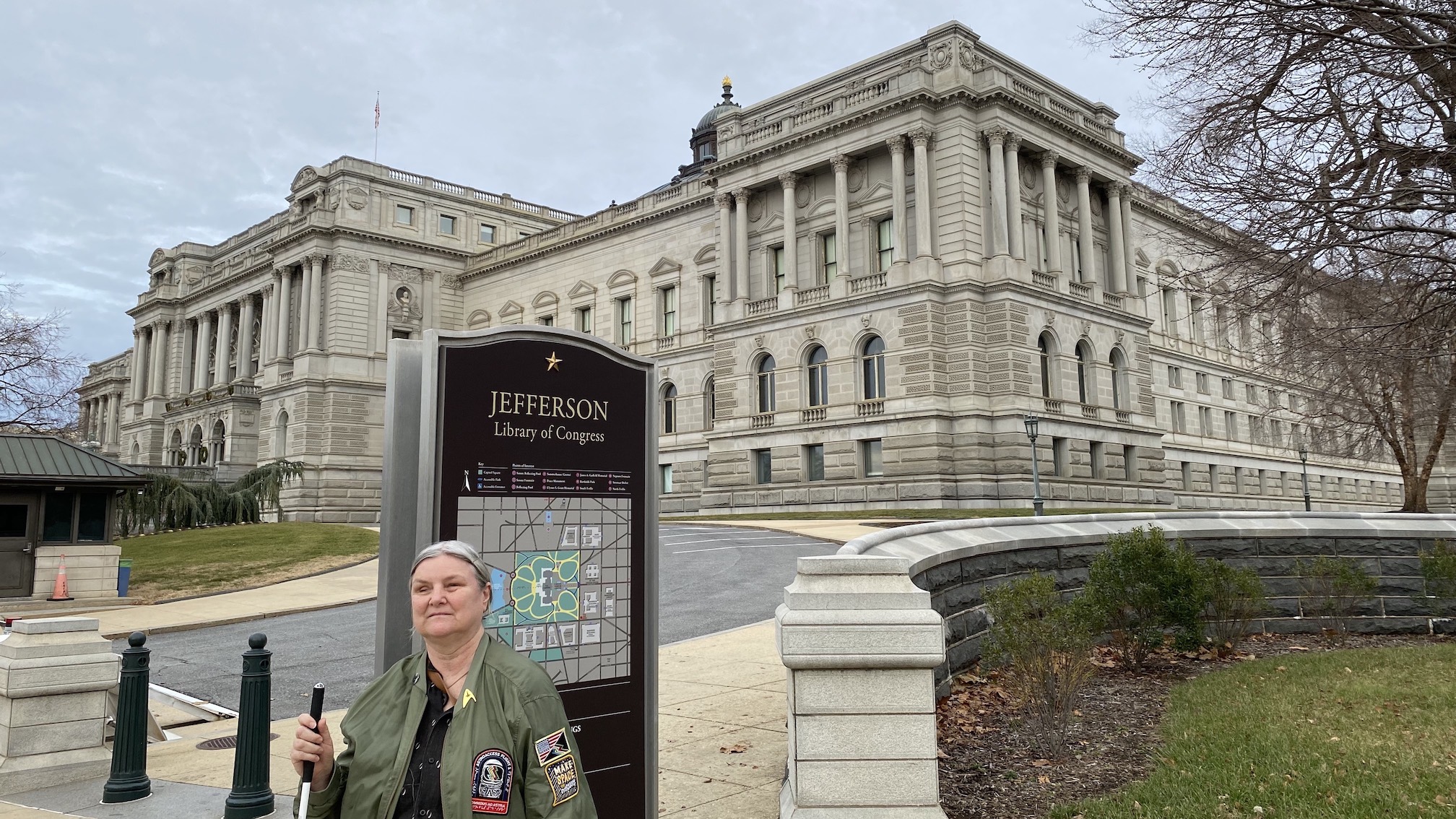
[photo of me, a white woman with silver hair and a determined expression, standing in front of the Library of Congress Jefferson Building under a cloudy January sky, holding a white cane and wearing an AstroAccess flight jacket with a Starfleet lapel pin.]
Disability in space | Linguistics in space | Teaching and research | Contact
If you want to know my "story", I recommend reading the transcript of my Radiolab interview, and/or listening to the show (which is also available on YouTube with ASL interpretation).
Humans have always wanted to go to space, and as long as we have the means to fight off gravity to get there, we'll go. And we'll stay as long as we can. And we'll eventually build our homes and factories and science labs on the moon and on Mars and beyond.
And yet, space is dangerous; you might even say that space is always trying to kill you. It is inevitable that human colonies in orbit and beyond will be populated by hopeful, capable, tenacious people whose various disabilities tell the story of how space did not quite kill them.
This provides us with a very interesting sociological question. In space, unlike on Earth, there is no easy way to swap out disabled employees for fresh ones, and the limited resources and tight living conditions inevitable in off-world colonies will mean that we cannot afford to feed, protect, and provide oxygen for folk who are not contributing. Everybody there must be working.
So if you think that space colonies will be full of gorgeous, firm-jawed, steely-eyed astronauts who are strong and able-bodied, you might want to recalibrate.
Humanity's future in space will be populated by gorgeous, firm-jawed, metaphorically steely-eyed astronauts who have missing limbs, who are deaf or blind, and who have skeletons that are weakened by long exposure to microgravity. But they will still be hopeful, capable and tenacious, and they will still have jobs to do.
I am proud to be a project lead, flight operations lead, and member of the blind ambassador crew for Mission: AstroAccess, an ongoing project utilizing zero-G parabolic flights, ground research, and analog missions to investigate factors that impact the viability of disabled people serving as crew on suborbital and orbital flights with the goal of opening space to all.
On October 17, 2021, twelve disabled people (four blind, two Deaf, and six with mobility disabilities) flew on G Force One, the modified 727 utilized by Zero G Corporation. They carried out demonstrations and gathered data on how disabled people can work effectively in microgravity. Ambassadors and ground staff are currently preparing publications analyzing results.
... Also, it was amazing! Also-also, nobody got sick! Also-also-also, I got to talk about it on Radiolab!
On December 14, 2022, I was delighted to fly for a second time with thirteen other disabled flyers and a crew of marvelous support personnel including representatives from NASA, Virgin Galactic, and other companies currently at the forefront of space exploration. We introduced new studies and took next steps on others.
Here is a brief video of me on AstroAccess Flight 2, performing several iterations of a "seat-docking drill" (and also a handstand). Each task had to be performed within approximately 20 seconds of "zero-gravity" conditions, when the aircraft was at a peak in its parabolic flight path.
Thanks to our friends at Zero G Corporation for their ongoing partnership with us and to our generous financial supporters. Check out our latest activities (and get more pics of the fun) at astroaccess.org.
Additionally, I serve on the Space for Humanity inclusion council and the SciAccess board.
Q:
What was 13-year-old Sheri's wildest dream?
A: Anything Star Trek!
Some years later, I was elated to serve as a linguistic consultant for Star Trek: Discovery Season 4. Live Long and Prosper, 13-year-old me! :)
In the real world, I am also a linguistic consultant for NASA's Europa Clipper project, and a board member of METI (Messaging Extraterrestrial Intelligence) International and SSoCIA (the Society for Social and Conceptual Issues in Astrobiology).
Astrobiology, braille, disability studies, language creation, phonology and syntax (applied), psycholinguistics, speech production (especially slips of the tongue), and xenolinguistics.